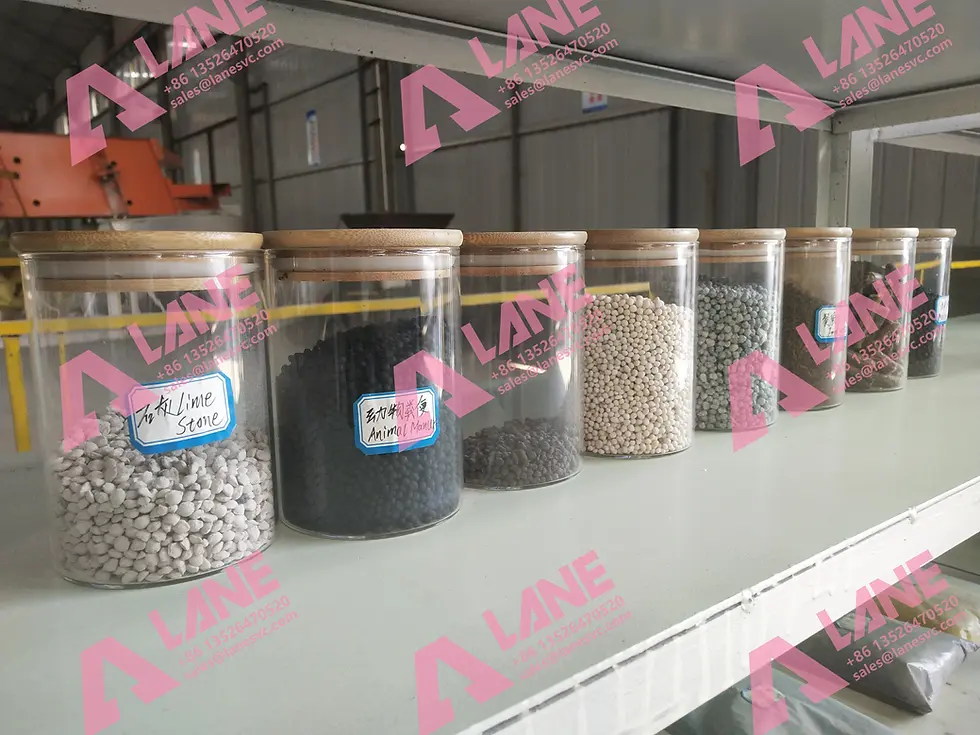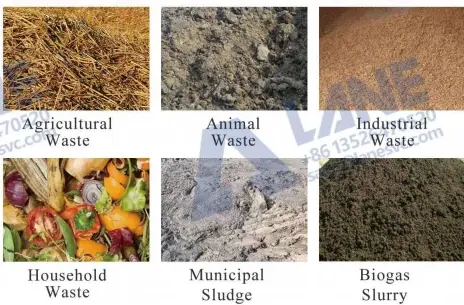What Are the Advantages of Organic Fertilizer?
- Efat Elahi
- Oct 14, 2025
- 5 min read
Organic fertilizers have long been praised for their positive impact on the environment, soil health, and plant growth. Unlike synthetic fertilizers that often cause long-term damage to the soil and the ecosystem, organic fertilizers are sustainable, eco-friendly, and improve soil fertility over time. As the world moves towards more sustainable agricultural practices, organic fertilizers are gaining increasing popularity among farmers and gardeners alike.
In this article, we will explore the advantages of organic fertilizers, the raw materials used to produce them, and the equipment and processes involved in setting up an organic fertilizer production line.

What Is Organic Fertilizer?
Organic fertilizer is a natural substance used to supply essential nutrients to plants. Unlike synthetic fertilizers, which are chemically manufactured, organic fertilizers are derived from natural sources like animal manure, plant residues, and other organic matter. Organic fertilizers are typically rich in macronutrients (nitrogen, phosphorus, and potassium) and micronutrients (iron, manganese, zinc, etc.), along with beneficial organic compounds like humic acid and amino acids.
Raw Materials for Organic Fertilizer Production
The raw materials used in the production of organic fertilizers are abundant, biodegradable, and often sourced from agricultural or food processing industries. Common raw materials include:
Animal Manure
Animal manure, such as cow dung, chicken litter, and sheep manure, is one of the most commonly used raw materials for organic fertilizer production. It is rich in essential nutrients, such as nitrogen, phosphorus, and potassium, that promote healthy plant growth.
Plant Residues
Crop residues such as corn stalks, rice husks, and fruit and vegetable waste are another valuable source of organic material. These residues not only provide nutrients but also improve soil structure when added to the soil.
Compost
Compost is created by decomposing organic matter, including food scraps, yard waste, and other plant-based materials. It is rich in organic matter and beneficial microorganisms that help break down nutrients for plant absorption.
Food Waste
Food waste, including fruit and vegetable scraps, is an abundant and underutilized raw material. Converting food waste into organic fertilizer helps reduce waste and creates a sustainable product for agriculture.
Green Waste
Green waste from gardening activities, such as grass clippings, leaves, and pruning, is also used to produce organic fertilizers. These materials are rich in essential nutrients and can be easily composted to form high-quality fertilizer.

Advantages of Organic Fertilizer
Improves Soil Health
One of the primary advantages of using organic fertilizers is that they improve the overall health and structure of the soil. Organic matter, when added to the soil, increases its water retention, aeration, and nutrient-holding capacity. Over time, organic fertilizers enrich the soil with beneficial microbes that help break down organic materials, enhancing nutrient cycling and improving soil fertility.
Increases Long-Term Soil Fertility
Unlike chemical fertilizers, which only provide short-term nutrient boosts, organic fertilizers improve long-term soil fertility by restoring soil organic matter. The nutrients in organic fertilizers are released gradually, providing plants with a steady supply of food over time, without causing nutrient leaching or soil acidification.
Environmentally Friendly
Organic fertilizers are derived from natural sources, making them environmentally safe and non-toxic. They do not contain harmful chemicals that could contaminate water sources or harm beneficial organisms in the soil, such as earthworms and beneficial insects. Additionally, organic fertilizers contribute to sustainable farming practices by reducing dependency on synthetic fertilizers and promoting waste recycling.
Supports Plant Growth Naturally
Organic fertilizers provide a balanced range of nutrients, improving plant health and growth without the risk of nutrient imbalances or toxicity. They also stimulate root development, promote stronger stems, and enhance the plant's resilience to pests and diseases. Organic fertilizers also improve the plant's ability to withstand stress from extreme weather conditions, such as drought.
Reduces the Risk of Soil Erosion
Because organic fertilizers improve soil structure and enhance soil's water retention capacity, they help prevent soil erosion, especially in areas prone to heavy rainfall or drought. Healthy, well-structured soil holds moisture better and resists erosion, thus reducing the loss of topsoil.
Cost-Effective
Organic fertilizers, when produced locally, are often more cost-effective than synthetic fertilizers. The raw materials—such as manure, compost, and plant residues—are generally abundant and inexpensive. Moreover, organic fertilizers can be produced on-site with relatively low investment, making them an affordable option for small-scale farmers.
Organic Fertilizer Production Line Process and Equipment
Setting up an organic fertilizer production line requires specific equipment for each stage of the process. Below is a detailed breakdown of the key stages and the machinery used:
Raw Material Preparation
The first stage involves collecting and preparing the raw materials. Depending on the materials used, they may need to be shredded, crushed, or mixed to create a uniform base for fermentation or composting.
Key Equipment:
Vertical shaft crushers: These machines are used to break down large pieces of raw material into smaller, manageable pieces.
Mixers: Mixes various raw materials to ensure even nutrient distribution.
Composting or Fermentation
The next step is composting or fermentation, where organic waste is broken down by microorganisms into a nutrient-rich humus-like substance. This process can take anywhere from a few weeks to several months, depending on the type of material and fermentation method used.
Key Equipment:
Compost Turners: Machines like crawler-type compost turners or wheeled compost turners are used to aerate the compost pile and speed up the decomposition process.
Fermentation Tanks: Used for controlled fermentation of the raw materials, ensuring optimal conditions for microbial activity.
Granulation (Optional)
For those looking to produce granular organic fertilizers, the composted material can be processed into granules. Granulation is especially useful for producing easy-to-apply, uniform-sized fertilizer granules.
Key Equipment:
Granulators: Machines like new-type organic fertilizer granulators or rotary drum granulators are used to form the compost into granules.
Dryers: These are used to reduce moisture content in the fertilizer, ensuring it is suitable for storage and transport.
Drying and Cooling
After granulation, the fertilizer is dried to reduce moisture content. Proper drying ensures the fertilizer remains stable and does not clump or decompose prematurely.
Key Equipment:
Rotary Drum Dryer: Used to dry the granulated fertilizer by tumbling it in a heated drum.
Cooler: A cooling system to bring down the temperature of the fertilizer after drying, making it safe for handling and packaging.
Screening and Packaging
Once dried and cooled, the fertilizer is screened to ensure uniform size and quality. The final product is then packed for sale and distribution.
Key Equipment:
Rotary Screener: Used to sort the fertilizer by size, removing any large particles or clumps.
Packing Machines: Automated machines fill and seal bags or containers for easy distribution.

Organic fertilizers offer a sustainable and effective alternative to synthetic fertilizers, providing numerous benefits for both the environment and plant health. By improving soil structure, promoting healthy plant growth, and reducing the reliance on harmful chemicals, organic fertilizers play a crucial role in advancing sustainable agricultural practices.
Setting up an organic fertilizer production line is a profitable venture that not only helps reduce waste but also supports sustainable farming and creates eco-friendly products. With the right raw materials, equipment, and process, organic fertilizers can be produced on a large scale, benefiting both farmers and the environment.
Email: sales@lanesvc.com
Contact number: +86 13526470520
Whatsapp: +86 13526470520






Comments